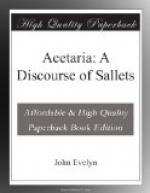6. Blite, Blitum; English Mercury, or (as our Country House wives call it) All-good, the gentle Turiones, and Tops may be eaten as Sparagus, or sodden in Pottage: There is both a white and red, much us’d in Spain and Italy; but besides its humidity and detersive Nature, ’tis Insipid enough.
7. Borrage, Borrago (Gaudia semper ago) hot and kindly moist, purifying the Blood, is an exhilarating Cordial, of a pleasant Flavour: The tender Leaves, and Flowers especially, may be eaten in Composition; but above all, the Sprigs in Wine, like those of Baum, are of known Vertue to revive the Hypochondriac, and chear the hard Student. See Bugloss.
8. Brooklime, Anagallis aquatica; moderately hot and moist, prevalent in the Scorbute, and Stone.
9. Bugloss, Buglossum; in mature much like Borrage, yet something more astringent. The Flowers of both, with the intire Plant, greatly restorative, being Conserv’d: And for the rest, so much commended by Averroes; that for its effects, cherishing the Spirits, justly call’d Euphrosynum; Nay, some will have it the Nepenthes of Homer: But indeed, what we now call Bugloss, was not that of the Ancients, but rather Borrage, for the like Virtue named Corrago.
Burnet, See Pimpinella.
10. Buds, Gemmae, Turiones; the first Rudiments and Tops of most Sallet-Plants, preferrable to all other less tender Parts; such as Ashen-Keys, Broom-buds, hot and dry, retaining the vertue of Capers, esteem’d to be very opening, and prevalent against the Spleen and Scurvy; and being Pickl’d, are sprinkl’d among the Sallets, or eaten by themselves.
11. Cabbage, Brassica (and its several kinds) Pompey’s beloved Dish, so highly celebrated by old [15]_Cato_, Pythagoras, and Chrysippus the Physician (as the only Panacea) is not so generally magnify’d by the rest of Doctors, as affording but a crass and melancholy Juice; yet Loosening if but moderately boil’d, if over-much, Astringent, according to C. Celsus; and therefore seldom eaten raw, excepting by the Dutch. The Cymae, or Sprouts rather of the Cole are very delicate, so boil’d as to retain their Verdure and green Colour. In raising this Plant great care is to be had of the Seed. The best comes from Denmark and Russia, especially the Cauly-flower, (anciently unknown) or from Aleppo. Of the French, the Pancaliere a la large Coste, the white, large and ponderous are to be chosen; and so the Cauly-flower: After boiling some steep them in Milk, and seethe them again in Beef-Broth: Of old they added a little Nitre. The Broccoli




